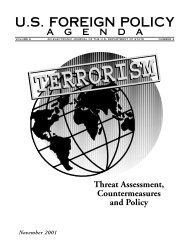s. history us history us history - Embassy of the United States
s. history us history us history - Embassy of the United States
s. history us history us history - Embassy of the United States
- No tags were found...
Create successful ePaper yourself
Turn your PDF publications into a flip-book with our unique Google optimized e-Paper software.
CHAPTER 11: THE NEW DEAL AND WORLD WAR IIOUTLINE OF U.S. HISTORYshalls, and <strong>the</strong> Marianas in a series<strong>of</strong> amphibio<strong>us</strong> assaults.THE POLITICS OF WARAllied military efforts were accompaniedby a series <strong>of</strong> importantinternational meetings on <strong>the</strong> politicalobjectives <strong>of</strong> <strong>the</strong> war. In January1943 at Casablanca, Morocco, anAnglo-American conference decidedthat no peace would be concludedwith <strong>the</strong> Axis and its Balkansatellites except on <strong>the</strong> basis <strong>of</strong> “unconditionalsurrender.” This term,insisted upon by Roosevelt, soughtto assure <strong>the</strong> people <strong>of</strong> all <strong>the</strong> fightingnations that no separate peacenegotiations would be carried onwith representatives <strong>of</strong> Fascism andNazism and <strong>the</strong>re would be no compromise<strong>of</strong> <strong>the</strong> war’s idealistic objectives.Axis propagandists, <strong>of</strong> course,<strong>us</strong>ed it to assert that <strong>the</strong> Allies wereengaged in a war <strong>of</strong> extermination.At Cairo, in November 1943,Roosevelt and Churchill met withNationalist Chinese leader ChiangKai-shek to agree on terms for Japan,including <strong>the</strong> relinquishment<strong>of</strong> gains from past aggression. AtTehran, shortly afterward, Roosevelt,Churchill, and Soviet leaderJoseph Stalin made basic agreementson <strong>the</strong> postwar occupation <strong>of</strong> Germanyand <strong>the</strong> establishment <strong>of</strong> anew international organization, <strong>the</strong><strong>United</strong> Nations.In February 1945, <strong>the</strong> three Alliedleaders met again at Yalta (nowin Ukraine), with victory seeminglysecure. There, <strong>the</strong> Soviet Union secretlyagreed to enter <strong>the</strong> war againstJapan three months after <strong>the</strong> surrender<strong>of</strong> Germany. In return, <strong>the</strong>USSR would gain effective control <strong>of</strong>Manchuria and receive <strong>the</strong> JapaneseKurile Islands as well as <strong>the</strong> sou<strong>the</strong>rnhalf <strong>of</strong> Sakhalin Island. The easternboundary <strong>of</strong> Poland was set roughlyat <strong>the</strong> Curzon line <strong>of</strong> 1919, th<strong>us</strong> giving<strong>the</strong> USSR half its prewar territory.Disc<strong>us</strong>sion <strong>of</strong> reparations to becollected from Germany — paymentdemanded by Stalin and opposed byRoosevelt and Churchill — was inconcl<strong>us</strong>ive.Specific arrangementswere made concerning Allied occupationin Germany and <strong>the</strong> trial andpunishment <strong>of</strong> war criminals. Alsoat Yalta it was agreed that <strong>the</strong> greatpowers in <strong>the</strong> Security Council <strong>of</strong><strong>the</strong> proposed <strong>United</strong> Nations shouldhave <strong>the</strong> right <strong>of</strong> veto in matters affecting<strong>the</strong>ir security.Two months after his returnfrom Yalta, Franklin Roosevelt died<strong>of</strong> a cerebral hemorrhage while vacationingin Georgia. Few figuresin U.S. <strong>history</strong> have been so deeplymourned, and for a time <strong>the</strong> Americanpeople suffered from a numbingsense <strong>of</strong> irreparable loss. Vice PresidentHarry Truman, former senatorfrom Missouri, succeeded him.WAR, VICTORY, ANDTHE BOMBThe final battles in <strong>the</strong> Pacific wereamong <strong>the</strong> war’s bloodiest. In June1944, <strong>the</strong> Battle <strong>of</strong> <strong>the</strong> Philippine Seaeffectively destroyed Japanese navalair power, forcing <strong>the</strong> resignation <strong>of</strong>Japanese Prime Minister Tojo. GeneralDouglas MacArthur — whohad reluctantly left <strong>the</strong> Philippinestwo years before to escape Japanesecapture — returned to <strong>the</strong> islands inOctober. The accompanying Battle<strong>of</strong> Leyte Gulf, <strong>the</strong> largest naval engagementever fought, was <strong>the</strong> finaldecisive defeat <strong>of</strong> <strong>the</strong> Japanese Navy.By February 1945, U.S. forces hadtaken Manila.Next, <strong>the</strong> <strong>United</strong> <strong>States</strong> set itssight on <strong>the</strong> strategic island <strong>of</strong> IwoJima in <strong>the</strong> Bonin Islands, abouthalfway between <strong>the</strong> Marianas andJapan. The Japanese, trained to diefighting for <strong>the</strong> Emperor, made suicidal<strong>us</strong>e <strong>of</strong> natural caves and rockyterrain. U.S. forces took <strong>the</strong> islandby mid-March, but not before losing<strong>the</strong> lives <strong>of</strong> some 6,000 U.S.Marines. Nearly all <strong>the</strong> Japanese defendersperished. By now <strong>the</strong> <strong>United</strong><strong>States</strong> was undertaking extensive airattacks on Japanese shipping andairfields and wave after wave <strong>of</strong> incendiarybombing attacks againstJapanese cities.At Okinawa (April 1-June 21,1945), <strong>the</strong> Americans met even fiercerresistance. With few <strong>of</strong> <strong>the</strong> defenderssurrendering, <strong>the</strong> U.S. Armyand Marines were forced to wage awar <strong>of</strong> annihilation. Waves <strong>of</strong> Kamikazesuicide planes pounded <strong>the</strong><strong>of</strong>fshore Allied fleet, inflicting moredamage than at Leyte Gulf. Japanlost 90-100,000 troops and probablyas many Okinawan civilians.U.S. losses were more than 11,000killed and nearly 34,000 wounded.Most Americans saw <strong>the</strong> fighting asa preview <strong>of</strong> what <strong>the</strong>y would face ina planned invasion <strong>of</strong> Japan.The heads <strong>of</strong> <strong>the</strong> U.S., British,and Soviet governments met at Potsdam,a suburb outside Berlin, fromJuly 17 to Aug<strong>us</strong>t 2, 1945, to disc<strong>us</strong>soperations against Japan, <strong>the</strong> peacesettlement in Europe, and a policyfor <strong>the</strong> future <strong>of</strong> Germany. Perhapspresaging <strong>the</strong> coming end <strong>of</strong> <strong>the</strong> alliance,<strong>the</strong>y had no trouble on vaguematters <strong>of</strong> principle or <strong>the</strong> practicalissues <strong>of</strong> military occupation, butreached no agreement on many tangibleissues, including reparations.The day before <strong>the</strong> Potsdam Conferencebegan, U.S. nuclear scientistsengaged in <strong>the</strong> secret ManhattanProject exploded an atomic bombnear Alamogordo, New Mexico. Thetest was <strong>the</strong> culmination <strong>of</strong> threeyears <strong>of</strong> intensive research in laboratoriesacross <strong>the</strong> <strong>United</strong> <strong>States</strong>. Itlay behind <strong>the</strong> Potsdam Declaration,issued on July 26 by <strong>the</strong> <strong>United</strong><strong>States</strong> and Britain, promising thatJapan would nei<strong>the</strong>r be destroyednor enslaved if it surrendered. IfJapan continued <strong>the</strong> war, however,it would meet “prompt and utterdestruction.” President Truman,calculating that an atomic bombmight be <strong>us</strong>ed to gain Japan’s surrendermore quickly and with fewercasualties than an invasion <strong>of</strong> <strong>the</strong>mainland, ordered that <strong>the</strong> bomb be<strong>us</strong>ed if <strong>the</strong> Japanese did not surrenderby Aug<strong>us</strong>t 3.A committee <strong>of</strong> U.S. military andpolitical <strong>of</strong>ficials and scientists hadconsidered <strong>the</strong> question <strong>of</strong> targetsfor <strong>the</strong> new weapon. Secretary <strong>of</strong>224225












